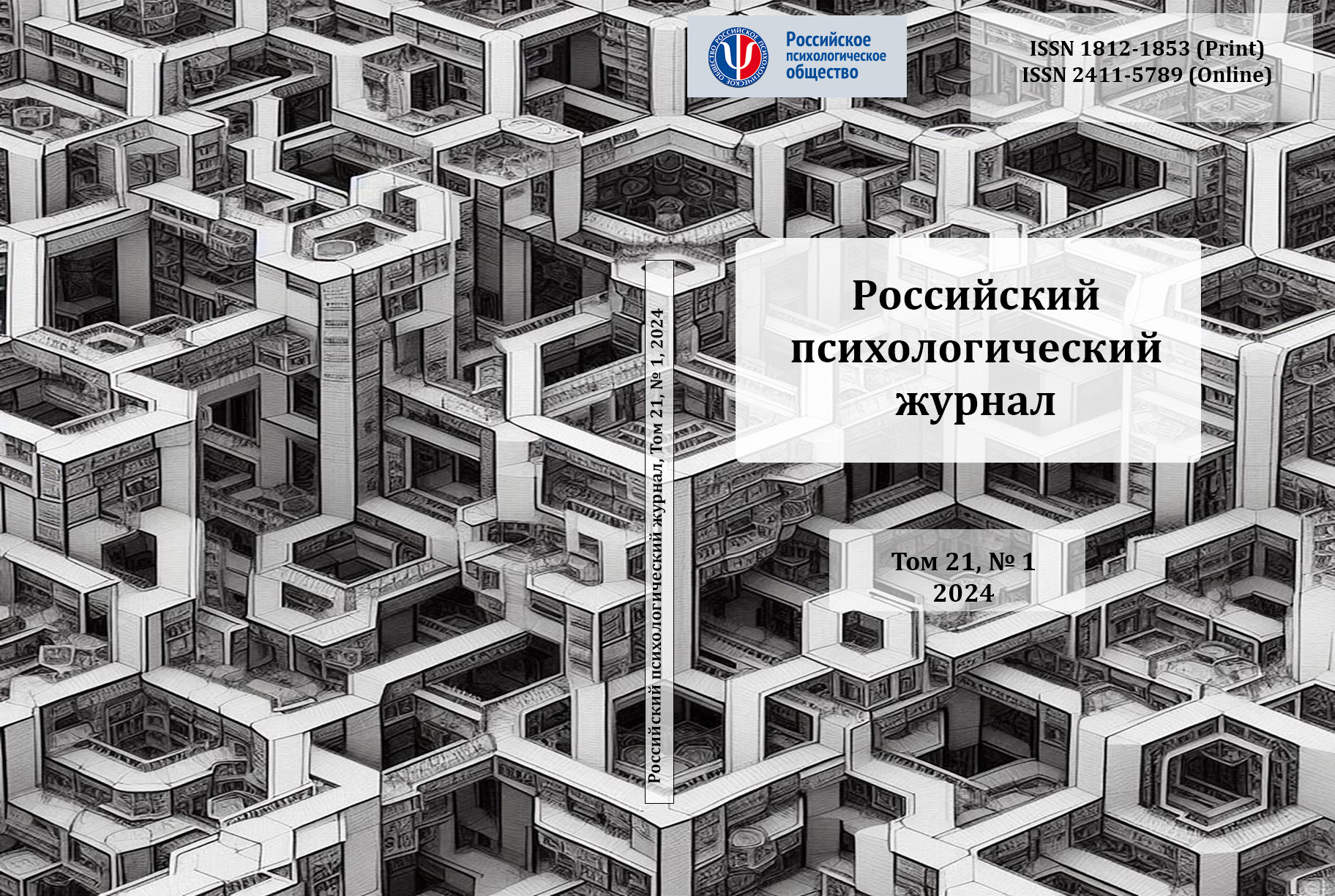Аннотация
Во введении представлено обоснование актуальности исследования субъективных факторов деструкции личности и эмоционального выгорания в профессиональном пространстве в условиях неопределенности. Представлены результаты анализа исследований внутренних предикторов, обуславливающих возникновение деструктивных трансформаций и эмоционального выгорания личности в ситуации современных рисков. Описаны аспекты отрицательного влияния сложной и энтропийной профессиональной среды на адаптацию личности и ее психологическое благополучие. Показаны барьеры успешной адаптации личности к новым требованиям с разным уровнем субъективного контроля. Дана содержательная характеристика психологических эффектов влияния профессиональной социализации на психологическое благополучие личности или формирование деструкций. Новизна исследования заключается в выявлении и описании субъективного контроля как фактора эффективного преодоления деструкций личности в профессиональной сфере разной направленности. В разделе Результаты показана специфика картины проявления показателей сформированности компонентов субъективного контроля личности у представителей технической и педагогической профессии. Описан анализ результатов эмпирического исследования компонентов системы субъективного контроля как фактора профилактики деструкций личности в процессе погружения в профессию.
В Обсуждении результатов представлено описание и интерпретация результатов эмпирического исследования проявления компонентов субъективного контроля и их связи с вероятностью деструктивных трансформаций и эмоционального выгорания у лиц с разной профессиональной направленностью. Данные эмпирического исследования показывают наличие рисков возникновения эмоционального выгорания и деструктивных трансформаций личности в ситуации дефицитов и рисков субъективного контроля. Впервые показаны ресурсные возможности субъективного контроля в профилактике деструктивных личностных трансформаций под влиянием погружения в профессию. В Заключении показана кластеризация психологических факторов, связанных с особенностями системы субъективного контроля, оказывающих влияние на возникновение эмоционального выгорания личности в условиях современных рисков неопределенности. Подчеркивается идея о том, что эффективность программ психологической помощи в преодолении личностью состояния эмоционального выгорания и деструкции в профессиональной сфере определяется уровнем мобилизации ресурсов субъективного контроля для достижения успеха и психологического благополучия.
Библиографические ссылки
Абакумова, И. В., Годунов, М. В., Пеньков, Д. В. (2019). Стратегии смыслообразования: переход от дуальности к триалектике. Российский психологический журнал, 16(1), 52–76. https://doi.org/10.21702/rpj.2019.1.3
Асмолов, А. Г., Шехтер, Е. Д., Черноризов, А. М. (2017). Преадаптация к неопределенности как стратегия навигации развивающих¬ся систем: маршруты эволюции. Вопросы психологии, 4, 3–27.
Барабанщикова, В. В., Кузнецова, А. С. (2022). Современные тенденции в развитии психологических исследований труда и трудящегося в динамичной профессиональной и организационной среде. Национальный психологический журнал, 4 (48), 3–8. https://doi.org/10.11621/npj.2022.0401
Богдан, Н. Н., Масилова, М. Г. (2022). Методологические основы изучения эмоционального выгорания как основа профилактической работы. Азимут научных исследований: педагогика и психология, 3 (40), 43–47.
Водопьянова, Н. Е., Старченкова, Е. С. (2008). Синдром выгорания. Питер.
Карпова, Е. А., Дрынкина, Т. И. (2022). Стрессоустойчивость, копинг-стратегии и управление изменениями в ситуациях неопределенности. Ученые записки CПбУТУиЭ, 3, 245–254.
Крюкова, Т. Л., Куфтяк, Е. В. (2007). Опросник способов совладания (адаптация методики WCQ). Журнал практического психолога, 3, 93−112.
Леонтьев, Д. А. (1992). Тест смысложизненных ориентаций (СЖО). Смысл.
Поваренков, Ю. П. (2021). Основные подходы отечественных психологов к анализу деструктивных тенденций профессионализации личности. В И.Ю. Тарханова (Ред.) Социальное и профессиональное становление личности в эпоху больших вызовов: Междисциплинарный дискурс: сборник статей всероссийской конференции с международным участием (С. 115–123). Ярославль: РИО ЯГПУ.
Проненко, Е. А., Вашумирская, Д. В. (2023). Характеристики достижения целей в профессиональной деятельности молодых людей: связь с уровнем самоэффективности и локусом контроля. Инновационная наука: психология, педагогика, дефектология, 6(5), 18−26. https://doi.org/10.23947/2658-7165-2023-6-5-18-26
Родина, О. Н. (2019). Личностные деформации при развитии состояния хронического утомления. Вестник Московского университета. Серия 14. Психология, 1, 123–140.
Салихова, А. Б. (2020). Реализуемость личностных ценностей при разном уровне толерантности к неопределенности. Вестник Удмуртского университета. Серия «Философия. Психология. Педагогика», 30(2), 156–161. https://doi.org/10.35634/2412-9550-2020-30-2-156-161
Соловьев, М. Н. (2019). Психологическая устойчивость личности как фактор эффективного преодоления профессиональных стрессов. Вестник Московского государственного областного университета. Серия: Психологические науки, 3, 41–55.
Соловьева, С. Л. (2020). Выживание в условиях неопределенности. Медицинская психология в России, 12(2(61)).
Трофимова, Е. Л., Кузьмина, Г. А. (2022). Психологическая безопасность личности педагога в условиях неопределенности. Известия Иркутского государственного университета. Серия Психология, 39, 54–75. https://doi.org/10.26516/2304-1226.2022.39.54
Украинцева, Т. И. (2021). Психологическая устойчивость как механизм адаптации в жизненных кризисах. Молодой ученый, 1 (343), 150–154.
Шеховцова, Е. А. (2020). Актуальные вопросы изучения синдрома профессионального выгорания на современном этапе. Ученые записки CПбУТУиЭ, 1, 52–57.
Шинкаренко, М.В. (2012). Влияние профессиональной ориентации на социальные представления о здоровье. Северо-Кавказский психологический вестник, 10(3), 17−20.
Alessandri, G., Perinelli, E., De Longis, E., Schaufeli, W. B., Theodorou, A., Borgogni, L., Caprara, G. V., & Cinque, L. (2018). Job burnout: The contribution of emotional stability and emotional self‐efficacy beliefs. Journal of Occupational and Organizational Psychology, 91(4), 823–851. https://doi.org/10.1111/joop.12225
Holmström, A., Tuominen, H., Laasanen, M., Veermans, M. (2023). Teachers’ work engagement and burnout profiles: Associations with sense of efficacy and interprofessional collaboration in school, Teaching and Teacher Education, 132, 104251. https://doi.org/10.1016/j.tate.2023.104251
Hu, Ya., Zhang, Sh., Zhai, J., Wang, D., Gan, X., Wang, F., Wang, D., Yi, H. (2024). Relationship between workplace violence, job satisfaction, and burnout among healthcare workers in mobile cabin hospitals in China: Effects of perceived stress and work environment, Preventive Medicine Reports, 40, 102667, https://doi.org/10.1016/j.pmedr.2024.102667
Maunz, L. A., Glaser, J. (2024). Longitudinal dynamics of psychological need satisfaction, meaning in work, and burnout, Journal of Vocational Behavior, 150, 103971, https://doi.org/10.1016/j.jvb.2024.103971
Pacheco, N. (2020). Nature or Nurture: The Relationship between Self-Care, Personality Traits, and Burnout in Critical Care Healthcare Professionals. Journal of Nursing & Care, 9(4). https://doi.org/10.37421/jnc.2020.9.505
Scherbakova, Т. N., Misirov, D. N., Akopyan, M. A., Ogannisyan, L. The student as a subject of transformative in the period of professional training. E3S Web of Conferences, 175, 15013, https://doi.org/10.1051/e3sconf/202017515013
Slowiak, Ju. M., Jay, G. M. (2023). Burnout among behavior analysts in times of crisis: The roles of work demands, professional social support, and psychological flexibility, Research in Autism Spectrum Disorders, 105, 102185. https://doi.org/10.1016/j.rasd.2023.102185
Toscano, F., Bigliardi, E., Polevaya, M. V., Kamneva, E. V., Zappalà, S. (2022). Working Remotely During the COVID-19 Pandemic: Work-Related Psychosocial Factors, Work Satisfaction, and Job Performance Among Russian Employees. Psychology in Russia: State of the Art, 15(1), 3–19. https://doi.org/10.11621/pir.2022.0101

Это произведение доступно по лицензии Creative Commons «Attribution» («Атрибуция») 4.0 Всемирная.
Copyright (c) 2024 Татьяна Н. Щербакова, Татьяна В. Сташкова, Сергей Н. Рягин
